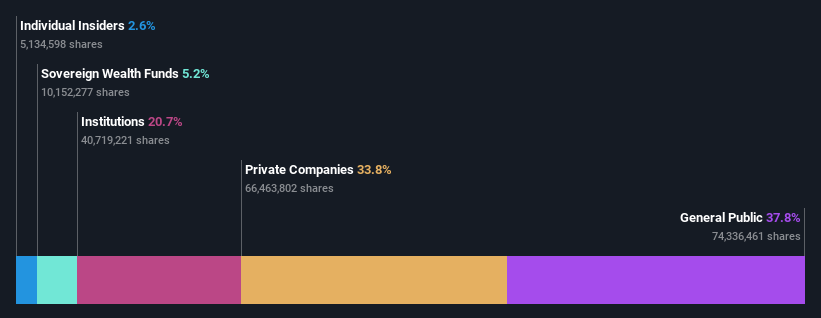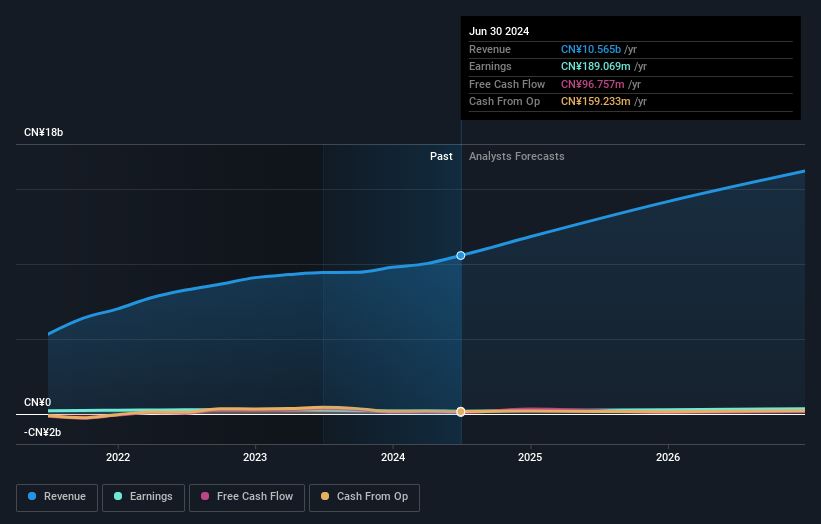Beijing Career International Co., Ltd's (SZSE:300662) last week's 29% decline must have disappointed retail investors who have a significant stake
Key Insights
- The considerable ownership by retail investors in Beijing Career International indicates that they collectively have a greater say in management and business strategy
- The top 8 shareholders own 52% of the company
- Institutional ownership in Beijing Career International is 21%
To get a sense of who is truly in control of Beijing Career International Co., Ltd (SZSE:300662), it is important to understand the ownership structure of the business. With 38% stake, retail investors possess the maximum shares in the company. Put another way, the group faces the maximum upside potential (or downside risk).
And last week, retail investors endured the biggest losses as the stock fell by 29%.
Let's take a closer look to see what the different types of shareholders can tell us about Beijing Career International.
Check out our latest analysis for Beijing Career International

What Does The Institutional Ownership Tell Us About Beijing Career International?
Institutional investors commonly compare their own returns to the returns of a commonly followed index. So they generally do consider buying larger companies that are included in the relevant benchmark index.
As you can see, institutional investors have a fair amount of stake in Beijing Career International. This can indicate that the company has a certain degree of credibility in the investment community. However, it is best to be wary of relying on the supposed validation that comes with institutional investors. They too, get it wrong sometimes. It is not uncommon to see a big share price drop if two large institutional investors try to sell out of a stock at the same time. So it is worth checking the past earnings trajectory of Beijing Career International, (below). Of course, keep in mind that there are other factors to consider, too.

Beijing Career International is not owned by hedge funds. The company's largest shareholder is Khorgos Taiyong Kangda Venture Capital Co., Ltd., with ownership of 30%. For context, the second largest shareholder holds about 5.2% of the shares outstanding, followed by an ownership of 4.5% by the third-largest shareholder.
We also observed that the top 8 shareholders account for more than half of the share register, with a few smaller shareholders to balance the interests of the larger ones to a certain extent.
Researching institutional ownership is a good way to gauge and filter a stock's expected performance. The same can be achieved by studying analyst sentiments. Quite a few analysts cover the stock, so you could look into forecast growth quite easily.
Insider Ownership Of Beijing Career International
The definition of an insider can differ slightly between different countries, but members of the board of directors always count. Company management run the business, but the CEO will answer to the board, even if he or she is a member of it.
I generally consider insider ownership to be a good thing. However, on some occasions it makes it more difficult for other shareholders to hold the board accountable for decisions.
We can see that insiders own shares in Beijing Career International Co., Ltd. As individuals, the insiders collectively own CN¥97m worth of the CN¥3.7b company. This shows at least some alignment. You can click here to see if those insiders have been buying or selling.
General Public Ownership
With a 38% ownership, the general public, mostly comprising of individual investors, have some degree of sway over Beijing Career International. While this size of ownership may not be enough to sway a policy decision in their favour, they can still make a collective impact on company policies.
Private Company Ownership
Our data indicates that Private Companies hold 34%, of the company's shares. It might be worth looking deeper into this. If related parties, such as insiders, have an interest in one of these private companies, that should be disclosed in the annual report. Private companies may also have a strategic interest in the company.
Next Steps:
It's always worth thinking about the different groups who own shares in a company. But to understand Beijing Career International better, we need to consider many other factors. Consider for instance, the ever-present spectre of investment risk. We've identified 3 warning signs with Beijing Career International (at least 1 which is potentially serious) , and understanding them should be part of your investment process.
But ultimately it is the future, not the past, that will determine how well the owners of this business will do. Therefore we think it advisable to take a look at this free report showing whether analysts are predicting a brighter future.
NB: Figures in this article are calculated using data from the last twelve months, which refer to the 12-month period ending on the last date of the month the financial statement is dated. This may not be consistent with full year annual report figures.
Have feedback on this article? Concerned about the content? Get in touch with us directly. Alternatively, email editorial-team (at) simplywallst.com.
This article by Simply Wall St is general in nature. We provide commentary based on historical data and analyst forecasts only using an unbiased methodology and our articles are not intended to be financial advice. It does not constitute a recommendation to buy or sell any stock, and does not take account of your objectives, or your financial situation. We aim to bring you long-term focused analysis driven by fundamental data. Note that our analysis may not factor in the latest price-sensitive company announcements or qualitative material. Simply Wall St has no position in any stocks mentioned.
 Index Options
Index Options CME Group
CME Group Nasdaq
Nasdaq Cboe
Cboe TradingView
TradingView Wall Street Journal
Wall Street Journal